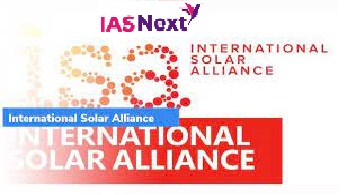CURRENT AFFAIRS
Get the most updated and recent current affair content on Padhaikaro.com
UN Observer status to Solar Alliance
- IAS NEXT, Lucknow
- 13, Dec 2021

Reference News:-
The UN General Assembly has conferred Observer Status to the International Solar Alliance (ISA), a historic decision which India said would help provide for a well-defined cooperation between the Alliance and the United Nations that would benefit global energy growth and development.
Significance of the observer status:
The granting of Observer Status to ISA in the General Assembly would help provide for regular and well-defined cooperation between the Alliance and the United Nations that would benefit global energy growth and development.
International Solar Alliance (ISA):
- The ISA was conceived as a joint effort by India and France to mobilise efforts against climate change through the deployment of solar energy solutions.
- It was presented by the leaders of the two countries at the 21st Conference of Parties (COP21) to the United Nations Framework Convention on Climate Change (UNFCCC) held in Paris in 2015.
- It is an alliance of more than 122 countries initiated by India.
- ISA is a coalition of solar resource rich countries lying fully or partially between the Tropic of Cancer and the Tropic of Capricorn to specifically address energy needs by harnessing solar energy.
- The Paris Declaration establishes ISA as an alliance dedicated to the promotion of solar energy among its member countries.
- ISA brings together countries with rich solar potential to aggregate global demand, thereby reducing prices through bulk purchase.
- It facilitates the deployment of existing solar technologies at scale, and promoting collaborative solar R&D and capacity building.
Secretariat:
- India and France jointly laid the foundation stone of ISA Headquarters.
- They inaugurated the interim Secretariat of the ISA in National Institute of Solar Energy campus, Gurugram, Haryana.
Objectives:
- The ISA’s major objectives include global deployment of over 1,000GW of solar generation capacity and mobilisation of investment of over US$ 1000 billion into solar energy by 2030.
- The ISA envisions to enable the full ecosystem for availability and development of technology, economic resources, and development of storage technology, mass manufacturing and innovation.
Signatories:
A total of 80 countries have signed and ratified the ISA Framework Agreement and 101 countries have only signed the agreement.
Need for:
- The reduced cost of technology would enable the undertaking of more ambitious solar energy programmes.
- Solar is key source of affordable and reliable energy. Successful project implementation could play significant role in achieving the universal energy access goal (SDG 7).
- ISA’s six programmes could be a game changer for the conservation of environment Solar Applications for Agricultural Use, Affordable Finance at Scale, Mini Grids, and Solar Rooftops and Solar E-mobility & Storage and Large-Scale Solar Parks.